An official website of the United States government
 United States Department of Labor
United States Department of Labor
Operate or control nuclear reactors. Move control rods, start and stop equipment, monitor and adjust controls, and record data in logs. Implement emergency procedures when needed. May respond to abnormalities, determine cause, and recommend corrective action.
Employment estimate and mean wage estimates for Nuclear Power Reactor Operators:
| Employment (1) | Employment RSE (3) |
Mean hourly wage |
Mean annual wage (2) |
Wage RSE (3) |
|---|---|---|---|---|
| 5,310 | 5.8 % | $ 50.23 | $ 104,470 | 1.1 % |
Percentile wage estimates for Nuclear Power Reactor Operators:
| Percentile | 10% | 25% | 50% (Median) |
75% | 90% |
|---|---|---|---|---|---|
| Hourly Wage | $ 36.71 | $ 43.56 | $ 50.02 | $ 58.23 | $ 64.02 |
| Annual Wage (2) | $ 76,360 | $ 90,600 | $ 104,040 | $ 121,120 | $ 133,170 |
Industries with the highest published employment and wages for Nuclear Power Reactor Operators are provided. For a list of all industries with employment in Nuclear Power Reactor Operators, see the Create Customized Tables function.
Industries with the highest levels of employment in Nuclear Power Reactor Operators:
| Industry | Employment (1) | Percent of industry employment | Hourly mean wage | Annual mean wage (2) |
|---|---|---|---|---|
| Electric Power Generation, Transmission and Distribution | 4,450 | 1.17 | $ 50.41 | $ 104,850 |
| Federal Executive Branch (OEWS Designation) | 500 | 0.02 | $ 51.01 | $ 106,110 |
| Scientific Research and Development Services | 140 | 0.02 | $ 52.18 | $ 108,530 |
| Local Government, excluding schools and hospitals (OEWS Designation) | 120 | 0.00 | $ 48.48 | $ 100,830 |
| Colleges, Universities, and Professional Schools | 30 | 0.00 | $ 30.89 | $ 64,260 |
Industries with the highest concentration of employment in Nuclear Power Reactor Operators:
| Industry | Employment (1) | Percent of industry employment | Hourly mean wage | Annual mean wage (2) |
|---|---|---|---|---|
| Electric Power Generation, Transmission and Distribution | 4,450 | 1.17 | $ 50.41 | $ 104,850 |
| Scientific Research and Development Services | 140 | 0.02 | $ 52.18 | $ 108,530 |
| Federal Executive Branch (OEWS Designation) | 500 | 0.02 | $ 51.01 | $ 106,110 |
| Colleges, Universities, and Professional Schools | 30 | 0.00 | $ 30.89 | $ 64,260 |
| Local Government, excluding schools and hospitals (OEWS Designation) | 120 | 0.00 | $ 48.48 | $ 100,830 |
Top paying industries for Nuclear Power Reactor Operators:
| Industry | Employment (1) | Percent of industry employment | Hourly mean wage | Annual mean wage (2) |
|---|---|---|---|---|
| Scientific Research and Development Services | 140 | 0.02 | $ 52.18 | $ 108,530 |
| Federal Executive Branch (OEWS Designation) | 500 | 0.02 | $ 51.01 | $ 106,110 |
| Electric Power Generation, Transmission and Distribution | 4,450 | 1.17 | $ 50.41 | $ 104,850 |
| Local Government, excluding schools and hospitals (OEWS Designation) | 120 | (7) | $ 48.48 | $ 100,830 |
| Colleges, Universities, and Professional Schools | 30 | (7) | $ 30.89 | $ 64,260 |
States and areas with the highest published employment, location quotients, and wages for Nuclear Power Reactor Operators are provided. For a list of all areas with employment in Nuclear Power Reactor Operators, see the Create Customized Tables function.
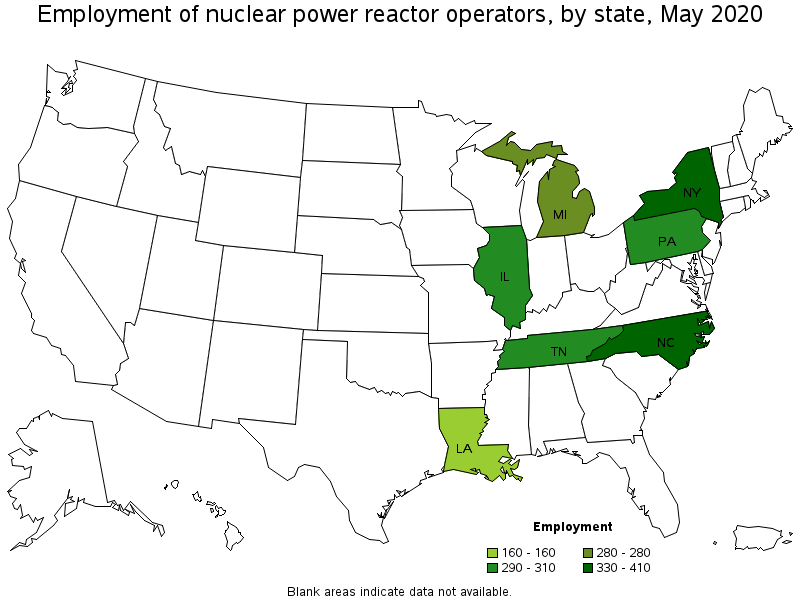
States with the highest employment level in Nuclear Power Reactor Operators:
| State | Employment (1) | Employment per thousand jobs | Location quotient (9) | Hourly mean wage | Annual mean wage (2) |
|---|---|---|---|---|---|
| New York | 410 | 0.05 | 1.23 | $ 55.01 | $ 114,420 |
| North Carolina | 330 | 0.08 | 1.99 | $ 50.06 | $ 104,130 |
| Pennsylvania | 310 | 0.06 | 1.47 | (8) | (8) |
| Illinois | 290 | 0.05 | 1.36 | $ 49.86 | $ 103,710 |
| Tennessee | 290 | 0.10 | 2.63 | $ 50.55 | $ 105,150 |
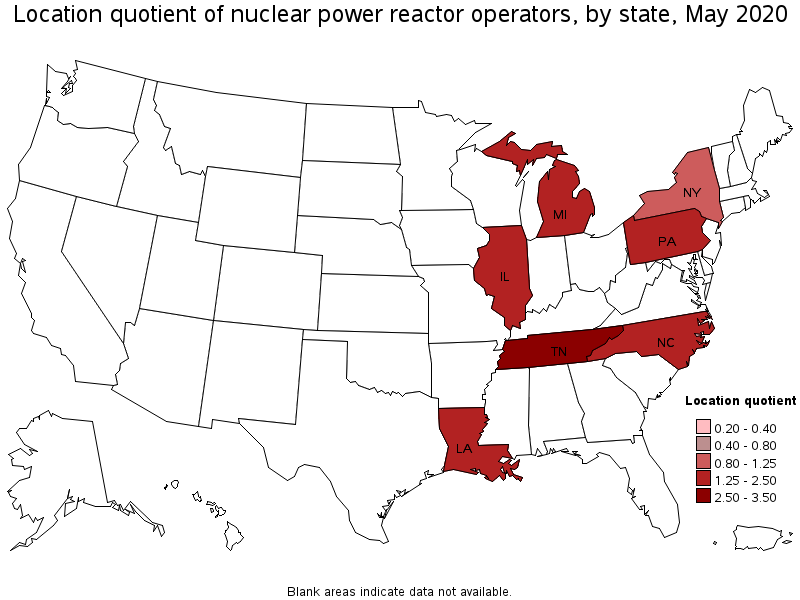
States with the highest concentration of jobs and location quotients in Nuclear Power Reactor Operators:
| State | Employment (1) | Employment per thousand jobs | Location quotient (9) | Hourly mean wage | Annual mean wage (2) |
|---|---|---|---|---|---|
| Tennessee | 290 | 0.10 | 2.63 | $ 50.55 | $ 105,150 |
| Louisiana | 160 | 0.09 | 2.26 | $ 49.10 | $ 102,130 |
| North Carolina | 330 | 0.08 | 1.99 | $ 50.06 | $ 104,130 |
| Michigan | 280 | 0.07 | 1.88 | (8) | (8) |
| Pennsylvania | 310 | 0.06 | 1.47 | (8) | (8) |
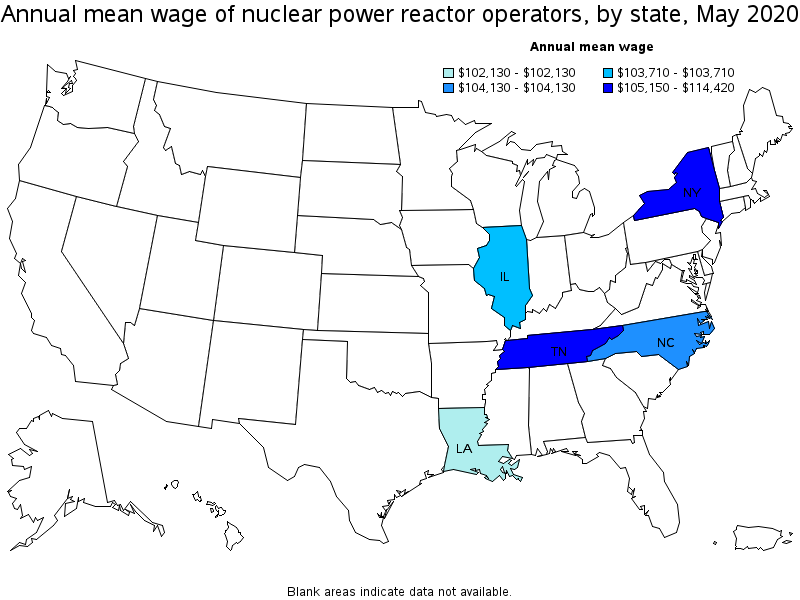
Top paying states for Nuclear Power Reactor Operators:
| State | Employment (1) | Employment per thousand jobs | Location quotient (9) | Hourly mean wage | Annual mean wage (2) |
|---|---|---|---|---|---|
| New York | 410 | 0.05 | 1.23 | $ 55.01 | $ 114,420 |
| Tennessee | 290 | 0.10 | 2.63 | $ 50.55 | $ 105,150 |
| North Carolina | 330 | 0.08 | 1.99 | $ 50.06 | $ 104,130 |
| Illinois | 290 | 0.05 | 1.36 | $ 49.86 | $ 103,710 |
| Louisiana | 160 | 0.09 | 2.26 | $ 49.10 | $ 102,130 |
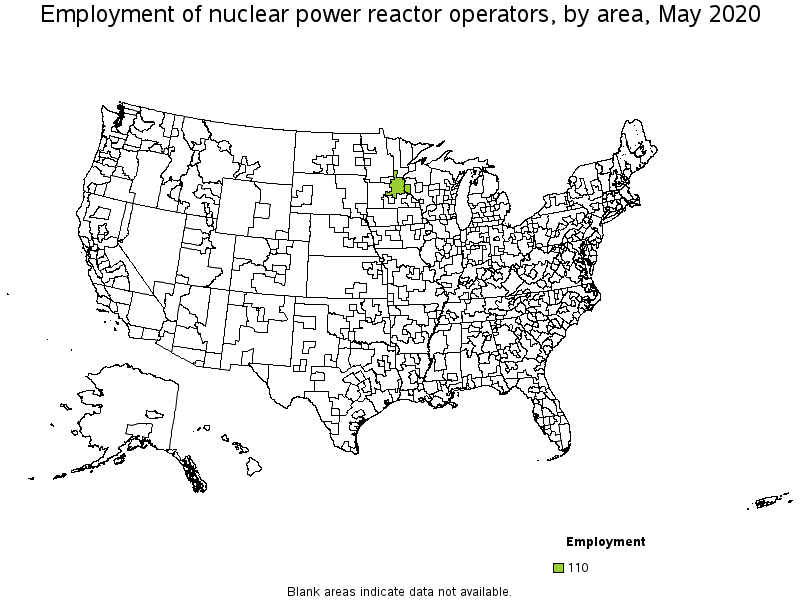
Metropolitan areas with the highest employment level in Nuclear Power Reactor Operators:
| Metropolitan area | Employment (1) | Employment per thousand jobs | Location quotient (9) | Hourly mean wage | Annual mean wage (2) |
|---|---|---|---|---|---|
| Minneapolis-St. Paul-Bloomington, MN-WI | 110 | 0.06 | 1.61 | $ 49.51 | $ 102,970 |
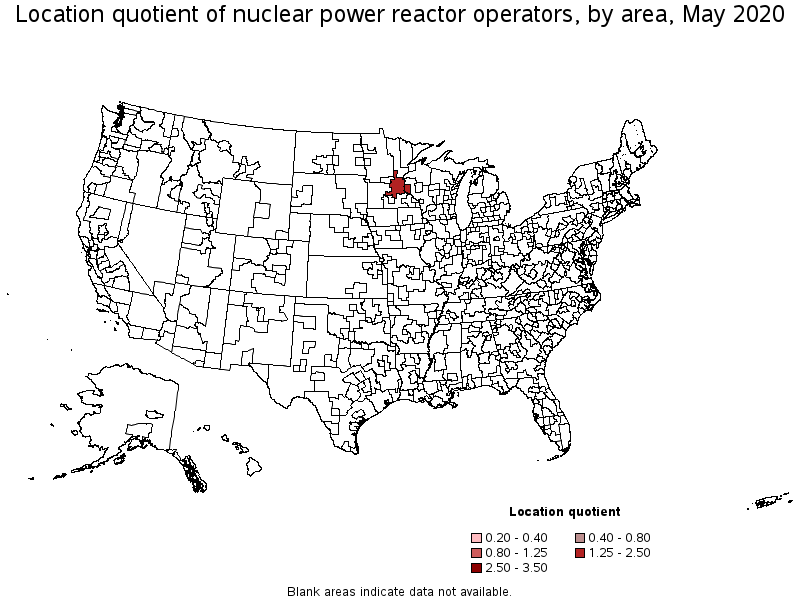
Metropolitan areas with the highest concentration of jobs and location quotients in Nuclear Power Reactor Operators:
| Metropolitan area | Employment (1) | Employment per thousand jobs | Location quotient (9) | Hourly mean wage | Annual mean wage (2) |
|---|---|---|---|---|---|
| Minneapolis-St. Paul-Bloomington, MN-WI | 110 | 0.06 | 1.61 | $ 49.51 | $ 102,970 |
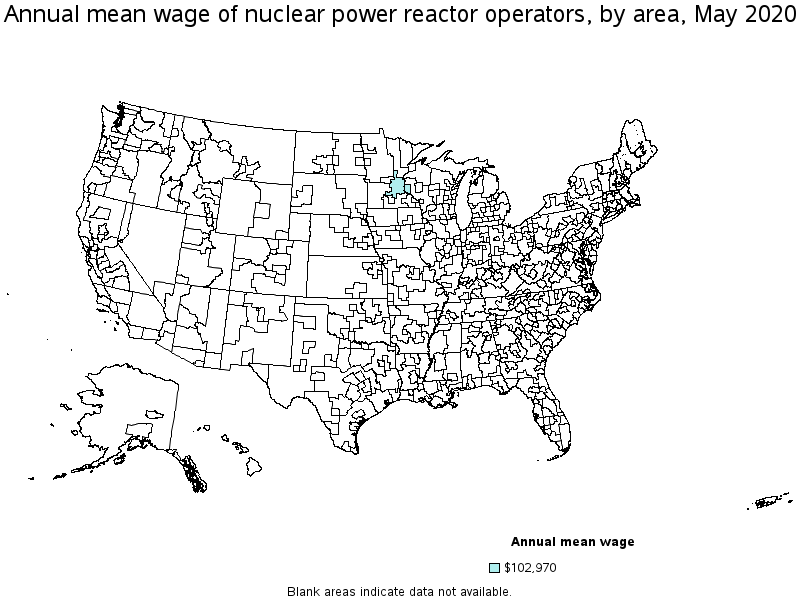
Top paying metropolitan areas for Nuclear Power Reactor Operators:
| Metropolitan area | Employment (1) | Employment per thousand jobs | Location quotient (9) | Hourly mean wage | Annual mean wage (2) |
|---|---|---|---|---|---|
| Minneapolis-St. Paul-Bloomington, MN-WI | 110 | 0.06 | 1.61 | $ 49.51 | $ 102,970 |
These estimates are calculated with data collected from employers in all industry sectors, all metropolitan and nonmetropolitan areas, and all states and the District of Columbia. The top employment and wage figures are provided above. The complete list is available in the downloadable XLS files.
The percentile wage estimate is the value of a wage below which a certain percent of workers fall. The median wage is the 50th percentile wage estimate—50 percent of workers earn less than the median and 50 percent of workers earn more than the median. More about percentile wages.
(1) Estimates for detailed occupations do not sum to the totals because the totals include occupations not shown separately. Estimates do not include self-employed workers.
(2) Annual wages have been calculated by multiplying the hourly mean wage by a "year-round, full-time" hours figure of 2,080 hours; for those occupations where there is not an hourly wage published, the annual wage has been directly calculated from the reported survey data.
(3) The relative standard error (RSE) is a measure of the reliability of a survey statistic. The smaller the relative standard error, the more precise the estimate.
(7) The value is less than .005 percent of industry employment.
(8) Estimate not released.
(9) The location quotient is the ratio of the area concentration of occupational employment to the national average concentration. A location quotient greater than one indicates the occupation has a higher share of employment than average, and a location quotient less than one indicates the occupation is less prevalent in the area than average.
Other OEWS estimates and related information:
May 2020 National Occupational Employment and Wage Estimates
May 2020 State Occupational Employment and Wage Estimates
May 2020 Metropolitan and Nonmetropolitan Area Occupational Employment and Wage Estimates
May 2020 National Industry-Specific Occupational Employment and Wage Estimates
Last Modified Date: March 31, 2021